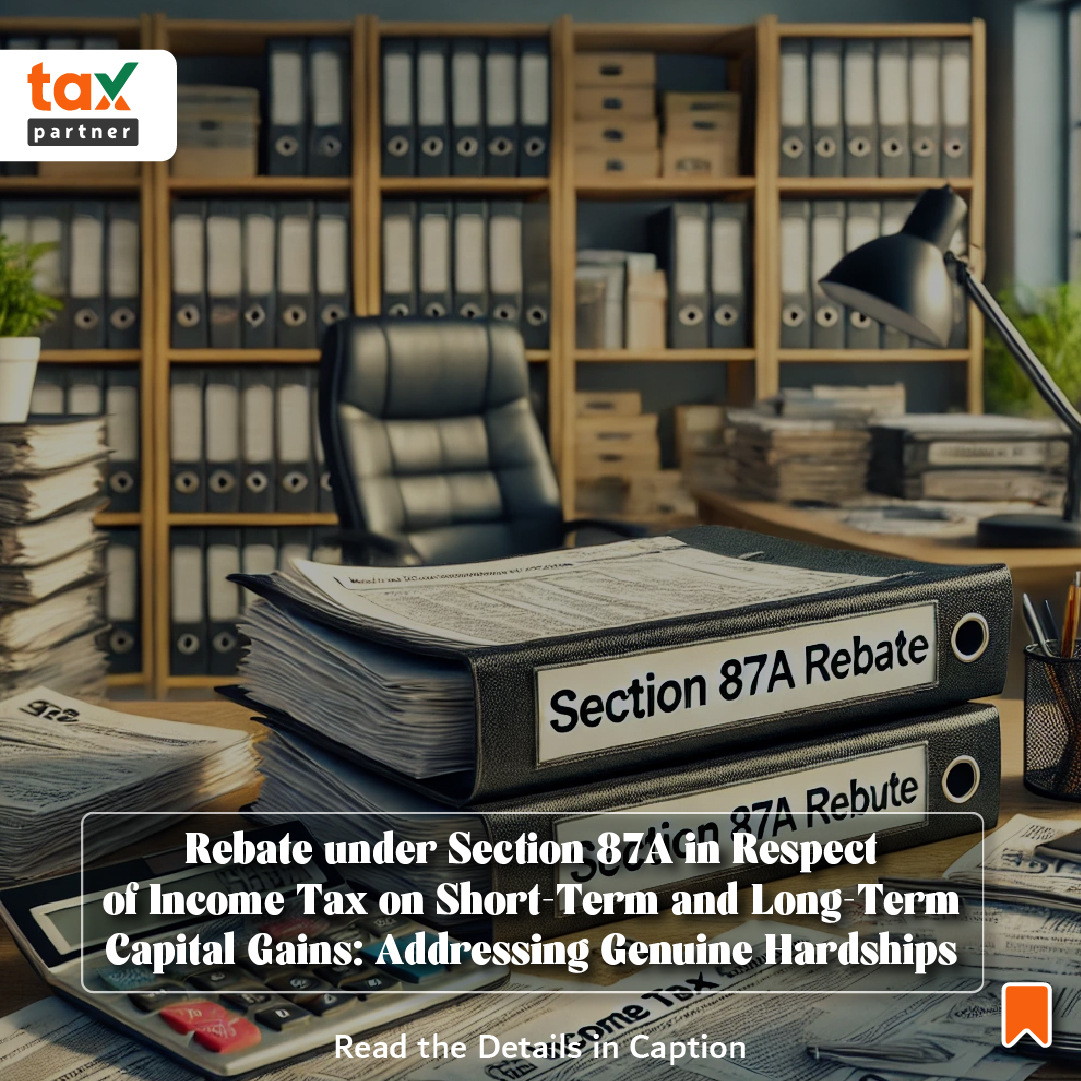Connect with us for all your queries



The Income-tax law in India provides various benefits and reliefs to taxpayers, one of the prominent ones being the rebate under Section 87A. This section offers relief to resident individuals, helping reduce their tax burden if their total income does not exceed a specified threshold. However, complications arise when capital gains are involved, particularly short-term capital gains (STCG) chargeable under Section 111A and long-term capital gains (LTCG) chargeable under Section 112. Despite the provisions of Section 87A allowing a rebate, there are certain interpretational issues and hardships faced by taxpayers, which need to be addressed.
Understanding Section 87A
Section 87A provides a tax rebate to resident individuals, reducing their tax liability if their income falls within prescribed limits.
Under the Normal Tax Regime:
The maximum rebate allowed under Section 87A is Rs.12,500 for resident individuals whose total income does not exceed Rs.5 lakh.
Under the Default Tax Regime (Section 115BAC):
For resident individuals opting for the default tax regime under Section 115BAC, the rebate has been enhanced. The proviso to Section 87A offers up to Rs.25,000 rebate if the total income does not exceed Rs.7 lakh.
Additionally, marginal relief is available for individuals slightly exceeding the Rs.7 lakh threshold under this regime.
The purpose of this provision is to offer relief to taxpayers with modest incomes. However, its applicability becomes unclear when it comes to income from capital gains, which are subject to special tax rates under Sections 111A, 112, and 112A.
Taxation of Capital Gains and the Restriction on Rebate
Section 111A:
This section imposes a 15% tax on short-term capital gains arising from the transfer of equity shares, units of an equity-oriented fund, and business trust where Securities Transaction Tax (STT) has been paid. There is no specific threshold for exemption under this section; the entire gain is taxed at a flat rate of 15%.
Section 112:
This section governs the taxation of long-term capital gains (LTCG) from assets other than those covered by Section 112A. For most cases, long-term capital gains are taxed at 20% after accounting for indexation benefits.
Section 112A:
Section 112A provides a preferential tax rate of 10% on long-term capital gains exceeding Rs.1 lakh arising from the transfer of equity shares, units of equity-oriented funds, and business trust where STT is paid. This section specifically restricts the application of rebate under Section 87A on income from long-term capital gains. The restriction means that any income tax payable on LTCG above Rs.1 lakh under Section 112A is excluded from the rebate.
Issue at Hand
The key issue revolves around the interpretation and applicability of the rebate under Section 87A concerning short-term capital gains under Section 111A and long-term capital gains under Section 112.
Section 112A clearly excludes the application of the rebate under Section 87A for long-term capital gains over Rs.1 lakh taxed at 10%. Therefore, individuals with capital gains under this section cannot claim the rebate for the portion of tax that relates to such gains.
However, neither Section 111A (tax on short-term capital gains) nor Section 112 (tax on long-term capital gains) contains a similar restriction. Therefore, the rebate under Section 87A should be available for taxpayers with income from short-term capital gains chargeable at 15% under Section 111A and long-term capital gains chargeable at 20% under Section 112.
Hardship Faced by Taxpayers
Despite the absence of any restriction in Sections 111A and 112, taxpayers are facing difficulty in claiming the rebate under Section 87A. This is because the income-tax utility used for filing returns and calculating tax does not allow the rebate on tax attributable to short-term capital gains or long-term capital gains under Sections 111A and 112.
The Income-tax department’s helpdesk has responded to grievances stating that the rebate under Section 87A is allowed only on income taxed at normal rates, implying that the rebate is not available for income taxed at special rates, such as capital gains. This interpretation, however, does not align with the legal provisions, as only Section 112A explicitly disallows the rebate, while Sections 111A and 112 do not impose any such restrictions.
Comparison of Capital Gains Taxation
Need for Rectification
The discrepancy in the application of the rebate under Section 87A in respect of short-term capital gains under Section 111A and long-term capital gains under Section 112 is causing genuine hardship to taxpayers. The income-tax utility’s current design and the department’s interpretation restrict taxpayers from claiming a benefit that they are legally entitled to.
Additionally, it is worth noting that the tax under Section 111A is charged on the entire capital gain, whereas under Section 112A, the tax is levied only on long-term capital gains exceeding Rs.1 lakh. This makes the denial of the rebate in respect of short-term capital gains particularly harsh, as these taxpayers do not enjoy any threshold exemption like those under Section 112A.
Conclusion
In conclusion, the restriction on the rebate under Section 87A should only apply to income chargeable under Section 112A, as explicitly stated in the law. There is no legal basis for denying the rebate in respect of short-term capital gains under Section 111A and long-term capital gains under Section 112. The Income-tax Department should address this issue and modify the tax utility to reflect the correct position of the law. Allowing the rebate under Section 87A for capital gains taxable under Sections 111A and 112 will provide much-needed relief to resident individuals, especially those with modest incomes and capital gains.
This rectification will help eliminate unnecessary grievances and ensure that taxpayers are not burdened unfairly.
Tax Partner is India’s most reliable online business service platform, dedicated to helping you in starting, growing, & flourishing your business with our wide array of expert services at a very affordable cost.